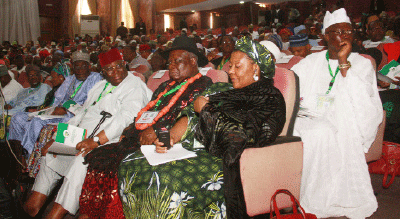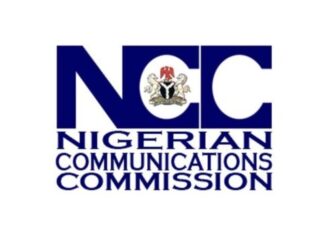Before now, it seemed only some sections of southern Nigeria wanted to go their own way; but with the commencement of the confab, developments point to the fact that the North also wants to opt out. Assistant Editor, North, Chuks Ehirim, wonders whether the centre can still hold
Delegates at the conference
The national conference inaugurated by President Goodluck Jonathan in Abuja on March 17 took off with the usual intrigues of Nigerian politics, resulting in major disagreements between the leadership of the conference, headed by former Chief Justice (CJ) Idris Legbo Kutigi, and the delegates.
The bone of contention is the rules of proceedings at the conference, which resumed after one week recess. The first business was to discuss the rules prepared by the secretariat, to guide the conduct of the delegates for the three months the conference will run.
On the mode of reaching decisions at the conference, especially when there is no consensus, while the rules recommended the endorsement of such matter by 75 percent or three-quarters of the delegates, most of the conferees settled for two-third majority, a view that did not go down well with a few but powerful number of the delegates backed by Kutigi.
Debates on this particular issue threw the conference into a rowdy session. Outside this issue, there was another problem emanating from an attempt to gag the press at the conference through Order 14 Rule which had sought sanctions against media organisations that publish or broadcast information considered injurious or unfavourable to the conference. This anti-media stance was, however, defeated before it could take root.
There was also the issue of the fate of the conference outcome. Though many of the delegates favoured the use of referendum, Kutigi blocked its adoption. This polarised the conference into North and South.
For those opposed to the 75 per cent proposal, this concept or model is not only anachronistic but will be a mirage to achieve. Some political pundits see the insistence of some Northern delegates on it as a ploy to rubbish the entire process, thereby proving right the earlier insinuation of critics of the conference that it will only end up a huge waste of public funds and an exercise in futility.
Investigation by TheNiche, however, revealed that the clause it was actually inserted by the conference organisers, to checkmate those who openly boast of numerical strength in the country, which gives them advantage over others, especially when it comes to deciding national issues through the ballot.
But the controversy was not totally disadvantageous to the conferees, especially groups that appeared to have come to Abuja unprepared. This could be said of most South East delegates who rose from the sitting of Monday, March 24, to have a group meeting for the first time since arriving Abuja.
According to a delegate at the meeting that was held at Apo, what happened at the conference venue earlier in the day had jolted many of them from Igboland.
“Most of us at the South East delegates meeting last night pretended not knowing the implication of allowing the argument for 75 per cent to stand. But by the time those who understand the game plan of the proponents of the view addressed the audience, it began to dawn on all that we are here for serious battle,” said the source.
He complained that while the elders from the North and other parts of the country are the ones sounding more bellicose, their counterparts from the South East prefer being moderate. He added, however, that at the end of that night’s meeting, some far-reaching decisions were taken by the Igbo delegates. These included canvassing support firmly for such issues as devolution of powers,fiscal federalism,citizenship rights among other things, on the floor of the conference.
They also set machinery in motion to lobby delegates from the South West, South South and Middle Belt geo-political zones to build consensus on issues of common interest to the groups. The South South group is hell-bent on pursuing its resource control agenda while the South West wants fiscal federalism and power devolution among other issues. The North, on the other hand, is mortally opposed to any of the above.
The position of the North was marshalled at a retreat organised by the Arewa Consultative Forum (ACF) for delegates from the three geo-political zones of North Central, North East and North West at A Class Restaurant, Wuse 2,Abuja, on Friday, March 21.
A position paper of the ACF presented to the delegates at the occasion by its chairman and former Inspector General of Police (IGP), Ibrahim Coomassie, made it clear that the North never canvassed for the national conference but“agreed that any national dialogue aimed at improving the unity, stability and harmony of the nation would be welcomed”.
The Northern leaders, therefore, shut down most of the items their counterparts from the South would most likely want to shed their blood fighting for. “ACF is not aware of any federal system that could reasonably be described as true federalism that is universally accepted. That may explain why no two federal systems are self-same, as federal system has more to do with the circumstance of its emergence,” it said.
Though the body did not reject in totality the clamour for powershift or rotational presidency, it, however, opposed its being made a constitutional matter, preferring that it be left for political parties to decide on.
It settled for the presidential system of government, but favours the unicameral legislative system in place of the dual legislature that we now have. On the agitation for creation of additional states, which is most strident from the South East zone, ACF did not hide its disdain for it.
On residency/indigeneship, ACF had this to say: “Since all communities are settlers, some come in the morning, others settle in the afternoon while some others arrive in the evening, ACF wishes to submit that automatic indigene-ship be reserved for all those who are born in that local government, while settler status be reserved for those who arrived in a particular place. This is because being born in a place is a non-choice factor and that is why all those born in America or any other developed country become citizens of that country automatically.”
Some of the positions taken by the ACF are most likely going to be pursued by the Northern delegates at the conference, to the chagrin of those from the South. The Igbo delegates, TheNiche gathered, have decided not to be too preoccupied with demand for the creation of additional states, but they will never give in to the rejection of the fiscal federalism and devolution of powers, with a view to making the centre weak.
A delegate from the South East told TheNiche that “this will accord Ndigbo and other partners who want to secede the right to do so if the need arises”.
The delegate argued further that, “if you devolve powers to the zones and make the right to secede possible, what is your business with state creation again?”
The next few days will certainly witness more provocative comments from ethnic jingoists, the type that was made on March 26, by prominent traditional ruler in the North, the Lamido Adamawa, who threatened that his state is ready to pull out of Nigeria and join their kith and kin in Cameroun. There appears to be some silver lining in the sky for the conferees though, as delegates with civil society background have vowed to distance themselves from agitations bordering on ethnic sentiments.
At their meeting last Thursday presided over by Femi Falana, the delegates representing civil societies agreed that they will agitate for pan-Nigeria issues such as anti-corruption war and unity of the country.












